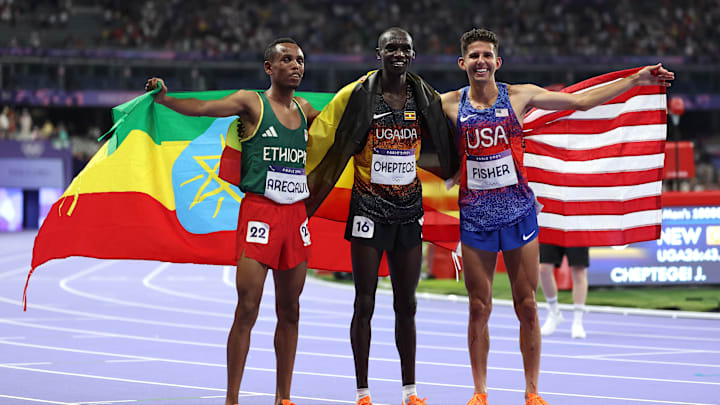Since American Galen Rupp won Olympic silver in the 10,000m at the London Olympics in 2012, runners of East African descent have dominated the event, winning 18-of-18 World Championship medals and 6-of-6 medals at the Olympics in Tokyo and Rio de Janeiro.
Tonight at the Paris Olympics, the East African Olympic medal count has ticked up to an imperfect eight-of-nine. American Grant Fisher has won Olympic bronze in the 10,000 meter finals to become the second American to medal in the event since Billy Mills won gold in 1964.
USA's Grant Fisher wins bronze medal in 10,000 meter finals in Olympics
This was no fluke race. The first 13 finishers ran below the previous Olympic record of 27:01.17 held by Keninisa Bekele. Thanks to brilliant Ethiopian team tactics in which three compatriots traded time leading the race, the field was pulled through 5,000 meters in 13:23 and then negative split for the top five to finish between 26:43.14 and 26:43.98.
Ethiopia has a history of employing “team tactics” which are often the subject of commentary by western television analysts. The team’s precise formations during the race were something to behold, while many runners seemed to be hanging on for dear life. While leading the race, Yomif Kejelcha turned his head to speak to Barihu Aregawi and Selemon Barega on several occasions.
What the Ethiopians didn’t anticipate was that their blistering pace would not be enough to shake the competition. Though about half of the field was out of contention by the 5,000-meter mark, a group of thirteen remained bunched until they wound up their kicks with 450m to go. So many runners sticking to this pace is unprecedented in championship 10,000-meter races. Many of the finishing times were also below the World Championship record of 26:46.31.
Grant Fisher, 27, has much to attribute his success to. What people will attribute Fisher's success in Paris to, though, is that he ran very little extra distance on the track in the 10k. In this retelling, he ran a perfect race aside from the imperfect color of his medal (and one twisted ankle from stepping on the rail).
When traveling around the oval 25 times, staying close to the rail provides a big advantage. To “trade” the lead, the Ethiopians had to maneuver in and out of lane one. Fisher was the biggest beneficiary from that pacing, and only on one occasion before the final kick did he leave the rail. Around him, even as the race strung out and more athletes ran single file, the amount of extra distance and number of useless surges were staggering.
During the last lap, a group of seven were in contention to medal. They were Fisher, the three Ethiopians, Fisher's old training partner the Canadian Mo Ahmed, world-record-holder Joshua Cheptegei from Uganda, and Kenyan Benard Kibet. Fisher remained in a strong position and, coming off the final turn, looked as if he had a shot at gold. As the three medalists separated from the field, Cheptegei had the strongest finish. Fisher, looking to have earned second, came up a bit short as he was out-leaned by Aregawi.
Grant Fisher's bronze is as good as gold for domestic track fans, or fans across the world wondering if East African dominance of the event would ever again be challenged. Fisher was rewarded for a brave, patient race. Though he will still compete in the 5K, starting on Aug. 7, he can spend the next few days reflecting on what it means not just to fortify his claim as Galen Rupp's successor, but perhaps make his case as the greatest American distance runner of all time. Fisher's bronze here is one that track fans will be discussing for a long time.
